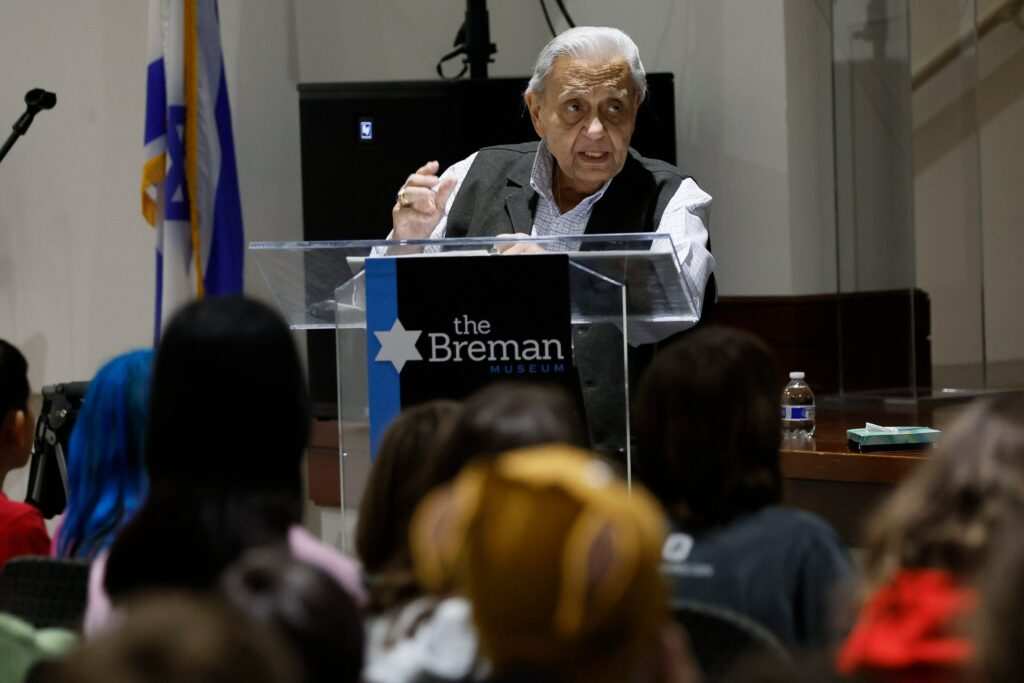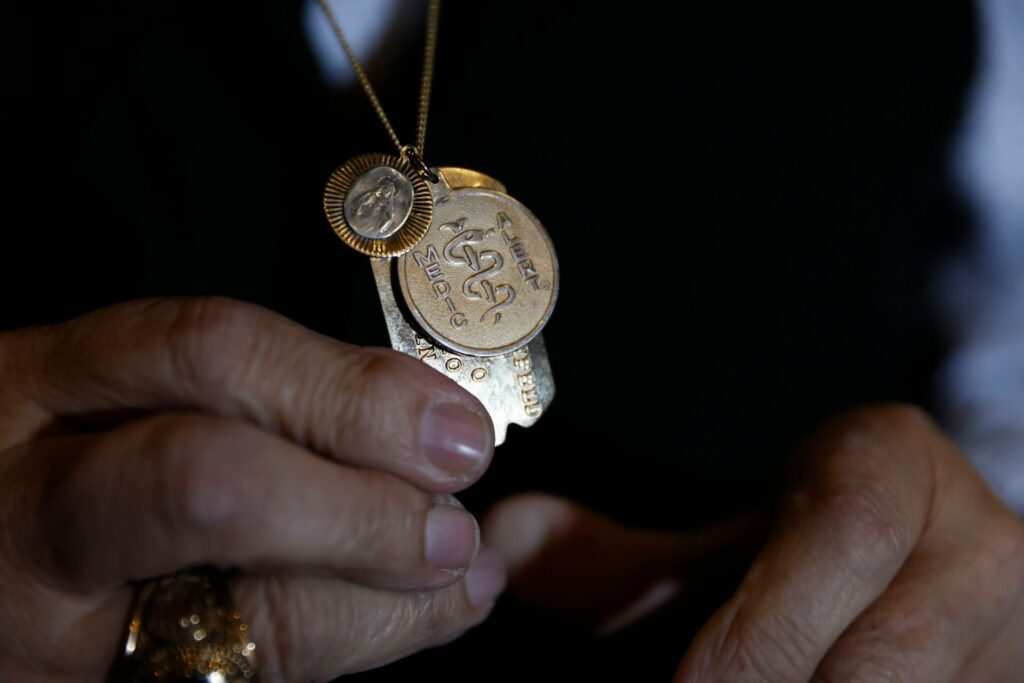The young boy hid under the bed as the Nazi soldier plunged a blade into his mattress. It grazed his chin, but George Rishfeld didn’t make a sound.
Family friends, who were Catholic, had taken him in as one of their own in German-occupied Poland. They urged him to stay inside and not to speak if he did venture out.

On one rare outing, a Nazi patrolman approached as he walked along a street in Warsaw. The soldier pinched the boy’s cheek and asked where his mother was. Unused to speaking and still grappling with Polish, Rishfeld responded that she was in the “mud,” when he meant to say “ghetto.” Laughing, the Nazi figured the youngster was a comedian, handed him an apple and sent him on his way.
Nazi Germany and its collaborators killed about 1.5 million Jewish children, according to the U.S. Holocaust Memorial Museum. Many like Rishfeld survived with the help of compassionate gentiles.
Rishfeld will share his story at 2 p.m. Sunday at the William Breman Jewish Heritage Museum in Atlanta. Admission is free but registration is required. See thebreman.org. Titled “Bearing Witness,” the event comes a week before International Holocaust Remembrance Day.
“I was saved to tell this story. It’s that simple,” said Rishfeld, 84, who shares his story partly to counter Holocaust deniers. “The story has to be told because there are too many nonbelievers out there.”
Fleeing east
There are two parts to Rishfeld’s story, the one he was told by his parents and another he remembers. This is the part he was told.

Rishfeld was born in Warsaw in 1939, months before Germany invaded Poland. His father, Richard, was a successful furrier wealthy enough to hire servants, even a chauffeur. He spoke Hebrew and played on a Jewish men’s soccer team, which faced antisemitic attacks whenever it won. Richard and Lucy Rishfeld were members of their local synagogue.
Amid the Nazi invasion of Poland, Lucy Rishfeld wrapped her son in furs and fled with him to Russian-occupied Vilna, hoping they would be safe in the region where she’d grown up and still had family. Richard Rishfeld, a reservist in the Polish military, eventually joined them.
The Nazis attacked Russia in 1941, capturing Vilna and forcing the Rishfelds and many other Jews into ghettos. As the Nazis carried out the “Final Solution” — their plan for exterminating all Jews in Europe — they murdered Rishfeld’s aunt, uncle, 9-month-old cousin and maternal grandparents.
As the Germans prepared to destroy the ghetto where they were being held, Rishfeld’s parents secretly tossed him over a barbed wire fence to Helena Frackiewicz, a teenager who had worked as a bookkeeper in the Rishfelds’ fur factory. Frackiewicz’s father, Ludwik, had been the factory foreman. The Frackiewicz family opposed the Nazis and promised to protect young George.
In hiding
Rishfeld’s first memory is of arriving at the Frackiewicz family’s three-story apartment building in Warsaw, where he cried and asked for his mother. His protectors sought to console him.
“They kissed me on my lips so hard — they pressed so hard — my gums hurt. And they were hugging me,” he recalled. “And then they started putting food in my mouth. That calmed me down. Ultimately, they showed me so much love that I just couldn’t refuse it.”
He called his surrogate parents Mama and Papa and they treated him as their own. He fondly remembers falling headfirst into a pickle barrel in their kitchen.
Knowing they were risking their lives in hiding him, as evidenced by the Nazis’ mattress-slashing search for Jews one day, the Frackiewiczes told him not to speak much and to mostly stay in, even when other children played outdoors. To fight boredom, he’d look out the window, pretending to shoot the wounded Nazi soldiers arriving at the military hospital across the street. When one of the Frackiewiczes would take him outside, they would carry him down two flights of stairs in their building so only one set of footsteps would be heard.
So their young charge would fit in, the Frackiewiczes gave him a St. Christopher medal and routinely took him to church. One day, the Nazis showed up and started dragging Jewish children out of the sanctuary. Helena Frackiewicz urged Rishfeld to grab his stomach and cry, as if he were sick. Their subterfuge worked, and she carried him out past the Nazis.
Rishfeld’s father, who had escaped captivity and joined the armed resistance, visited his son twice during the war. He showed up the second time on Christmas Eve, wearing a stolen German military uniform. He brought his son a toy wooden gun.
“Where is Mommy? Why didn’t you bring Mommy?” Rishfeld remembered asking.
“Don’t worry. She is fine,” his father responded. “She will be with you soon.”
Richard Rishfeld later told his son he had lost contact with Lucy and believed she had been killed.
The reunion
Lucy Rishfeld’s talents saved her. Her Nazi captors recognized her sewing skills and sent her to a forced labor camp. She was certain her husband was dead.
After the Russians recaptured Vilna in 1944, Rishfeld’s parents sought to reunite with him. As Rishfeld’s mother prepared to travel by train to her son, she spotted a handsome man on the platform. He appeared well-fed and clean-shaven and was wearing a stolen Russian military uniform with polished boots. In contrast, she was malnourished and clothed in rags. Lucy realized it was Richard. They hugged. Then she slapped his face.
“How dare you look so good. How dare you smell so good,” Rishfeld remembers his mother’s description of their reunion.
Rishfeld recalls his parents’ arrival at his hiding place as the happiest moment of his life. At the same time, he was sad to leave his rescuers.
The Rishfelds were taken to a crowded camp for displaced people, where they stayed for nearly a year. They slept on the floor in a bleak apartment building and were often hungry. Other displaced children who had lost siblings amid the Holocaust jealously picked on Rishfeld because he had survived. The Rishfelds moved with a family friend to Belgium before resettling in New York City.
Righteous Among the Nations
Gratefully, Rishfeld’s family sent clothes and a gold ring studded with diamonds to the Frackiewiczes, who experienced deprivation living behind the Iron Curtain during the Cold War. They also contacted Yad Vashem, the World Holocaust Remembrance Center in Jerusalem, to recognize the Frackiewiczes’ heroism. In 1997, Ludwik and Ludmila Frackiewicz and their daughter, Helena, were included in Yad Vashem’s Righteous Among the Nations Program, which honors people who risked their lives saving Jews during the Holocaust.
To decide who is honored, a commission of Holocaust experts seeks survivors’ testimony or documentation. Rescuers receive medals and certificates, and their names are added to the Wall of Honor in the Garden of the Righteous at Yad Vashem. They also receive honorary Israeli citizenship.
As of January 2022, 28,217 people around the world have been named “Righteous Among the Nations.” Among them is Oskar Schindler, the businessman made famous by Steven Spielberg’s award-winning film “Schindler’s List.” Schindler has been credited with saving more than 1,000 Jews from deportation to Auschwitz, the Nazi complex in Poland where more than 1.1 million people died.
Yad Vashem has similarly honored many Catholic nuns who helped rescue Jewish children. Suzanne Vromen, a retired sociology professor, interviewed some for her book, “Hidden Children of the Holocaust: Belgian Nuns and Their Daring Rescue of Young Jews from the Nazis.” The nuns, she said in an interview, hoped the children they saved would convert to Catholicism, but they also “knew they were saving their lives.”
“They contend that what they did was to be expected; it was simply the humane thing to do,” she wrote in her book.
The largest share of people who have received “Righteous Among the Nations” recognition — 7,232 — were traced to Poland, where the Frackiewicz family aided Rishfeld and other Jews in Warsaw.
“In saving Jewish refugees,” Yad Vashem says in its database, “the Frackiewiczes were guided by humanitarian considerations and never expected anything in return.”
Bearing witness
Dozens of elementary schoolchildren from Decatur listened with rapt attention inside the Breman Museum’s auditorium recently as George Rishfeld spoke. He showed them a photo of Helena Frackiewicz, calling her his hero. He also showed them his St. Christopher medal, which he still wears on a chain.
“I am a living witness,” Rishfeld told them. “Now that you have heard me, you are all witnesses. And I am asking you to tell the story to whoever is going to stand still and listen to you.”
As a young man, Rishfeld experienced flashbacks and nightmares. He slept with his bedroom door open and the lights on. Over the years, his traumatic symptoms faded.
Meanwhile, he attended college, served in the U.S. Army between the Korean and Vietnam wars and worked in the electronics industry. Today, Rishfeld lives in Cumming. He and his wife, Pamela, celebrated their 51st wedding anniversary in June and have two daughters and six grandchildren.
Rishfeld did not begin talking publicly about his experiences until 1994, when his rabbi asked him to speak at a Holocaust remembrance event in Ventura, California. It was cathartic. Pamela remembers how he “cried through the whole thing.” Since then, Rishfeld has shared his story hundreds of times at clubs, houses of worship, public schools and other places. It’s heartwarming for him when people ask for his autograph or want to take photos with him.
“If I speak to 50 kids,” he said, “and one or two of them come up to me at the end and want to shake my hand, I know I am a winner because I know I reached at least those two kids.”
___
© 2024 The Atlanta Journal-Constitution
Distributed by Tribune Content Agency, LLC.



